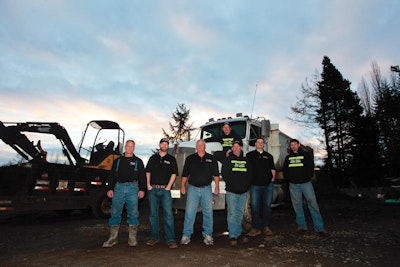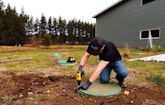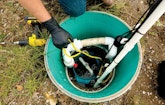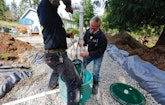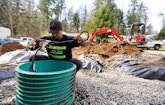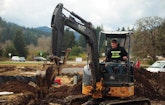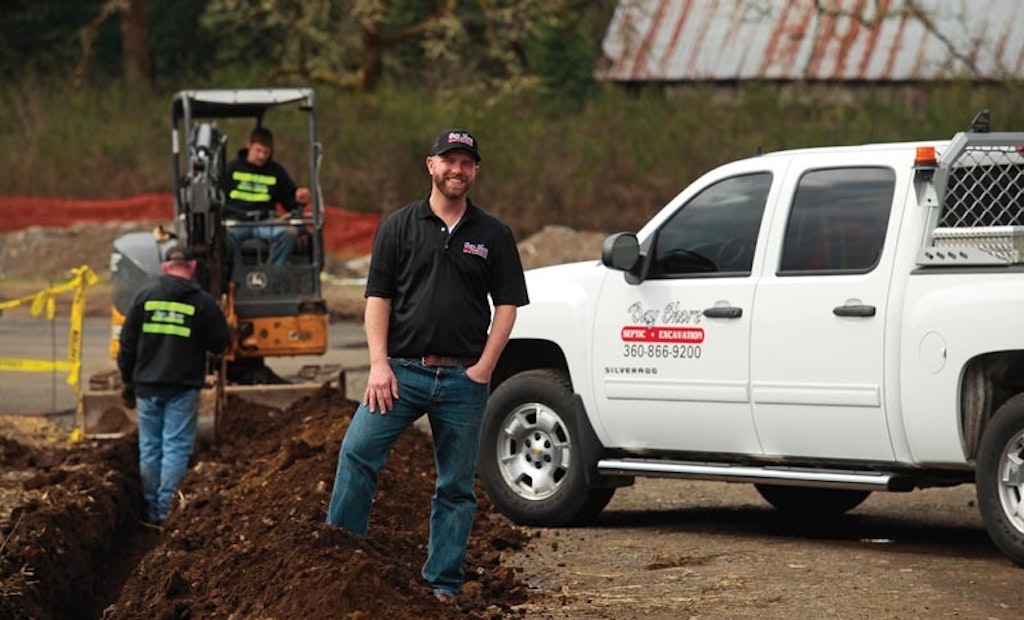
Interested in Trucks?
Get Trucks articles, news and videos right in your inbox! Sign up now.
Trucks + Get AlertsBay Shore Construction faces ever-tougher onsite system regulations designed to protect Washington’s Puget Sound and other high-quality waters.
Owner Brandon Thompson doesn’t mind at all. In fact, he welcomes the close scrutiny his company receives operating in five counties around Olympia, the state capital. “There’s tremendous knowledge locally behind all the lakes, streams and inlets,” says Thompson, who has owned the company since 2004, when he was just 24 years old. “There are always research and projects underway to better the Sound. Every four years there’s a new code book that determines how we install septic systems.
“I understand that. I get it. I’ve lived here my whole life and I want to help keep the waters clean. Ultimately, that’s our job. The state and county restrictions make our company all the more important. Without them, anybody could be doing this work.”
Of course, the direct beneficiaries of the company’s work are customers – some 50 to 100 homeowners who receive new or replacement onsite systems each year, installed in conditions that range from plain sand to volcanic basalt rock.
STARTING YOUNG
Bay Shore Construction was founded in 1989 by Ron Thompson, Brandon’s father, who had been in the logging industry around Aberdeen, Washington. He moved the family to Summit Lake, near Olympia, with plans to start a mini-storage business. Along the way he learned the onsite installation business and built a prosperous company around it.
In 2002, Brandon was working as a supervisor at a Costco warehouse when his father asked if he wanted to take over Bay Shore. “I said I had no interest in doing that,” Brandon recalls. “I was living a pretty good life. About a year later he asked me again if I had any interest. I said no, not even a little bit.”
Not long afterward, Brandon got married and started a family. Suddenly, he saw his father’s business as a good opportunity. “I went to my dad and told him I was interested in being a part of the company. And he said, ‘No, I gave you two opportunities, and you’re out.’ I said ‘OK,’ and left with my tail between my legs.”
Instead of giving up, though, he changed his days off at Costco to weekdays and showed up one morning to work with his father. “He said, ‘I don’t have anything for you.’ I decided that didn’t matter – I was going to help him one way or the other.” He worked for no pay for six months, at which point his father hired him for half his Costco salary. Six months after that they negotiated a sale of the business, with its two crew members, a backhoe, a bulldozer and a dump truck.
TRIAL BY FIRE
Soon after that, the elder Thompson announced he was taking a long vacation in Arizona. “He left me in charge,” Brandon says. “I was 24, and I was in charge of all the bidding, organizing the jobs, getting everybody together – all with little or no knowledge.” So began a steep learning curve that lasted several years.
His father came back after about four months and helped him out, but mostly, he learned by doing. With a newly minted installer’s license, he began forging connections, contacting local builders and onsite system designers. “I looked at every opportunity and I talked to every person I could,” he says. “The obstacle I had to overcome was my youth. People didn’t want to hire a young kid, and I looked and acted like a young kid. But somehow it worked out.”
Today, in addition to onsite installation and repair work, Bay Shore offers structure demolition, trenchless technologies, utility boring and trenching, and general excavation. Thompson also owns All-American Underground, which builds small-community potable water distribution systems and service lines and does leak detection and pipe bursting for line repairs.
The team includes Sam Hyatt, project manager; Fred Cady, equipment operator and site development specialist; Ron Funderburk, water distribution manager and cross-connection control specialist; Kenny Casassa, equipment operator; Robert Mykleby, dump truck driver and equipment operator; and Jaime Sparks, office manager. Cady was Ron Thompson’s first employee and his right-hand man; he has been with the business for 18 years.
Brandon’s wife, Amber, helps with the company’s social media and represents the business in charity endeavors that include service on the board of the local Big Brothers Big Sisters of America chapter. She spends most of her time caring for the couple’s three sons.
The company’s major equipment includes a 2003 Case 580 Super M backhoe, a 2007 John Deere 35D excavator, a 2002 John Deere 450G dozer, and a 2004 Kubota KX-121-3 excavator, plus a 2007 VACMASTERS SPV 800 vacuum trailer. The inventory also includes three dump trucks, a step van, two utility trucks, a pipe truck and a service truck.
TACKLING SITE CHALLENGES
As challenging as it was to take over the business, Thompson and his team face challenges daily with soils and topography: “We’re about an hour from Seattle and an hour from the ocean shore. We’re near the state capital, where all the major state agencies are based, so we’re under a microscope. Our standards are substantially higher than in much of the state.
“Since we work in five counties, the soils are all over the board. Near the ocean it’s sandy. Around the inlets in Thurston County, it’s very clay-based. It’s not uncommon for us to do a system where we take out 10 to 15 feet of clay until we hit sand. We fill that bed back up with sand to within 3 feet of the grade, and then add a foot of drain rock (or install chambers) followed by 2 feet of cover. To the south in the Yelm area in Thurston County, it’s sandy loam with big rocks.”
Most challenging are waterfront lots on Summit Lake. “There it’s all basalt rock,” says Thompson. “A lot of times there isn’t enough room on the lot to put in a complete septic system. So the owner has to get an easement for the property across the road, or actually purchase that property for the drainfield.”
They hammer through the rock to install the septic tank on the lakefront side, lining the bottom of the hole with sand, placing 4 inches of foam board around the tank sides and backfilling with sand over the top. Then they tunnel under or cut across the road to where there’s a little soil. Sometimes the native soil is enough for a drainfield; other cases call for a mound or an aerobic treatment unit.
MULTIPLE APPROACHES
In general, site conditions and designer preferences dictate the treatment approach. Bay Shore installs conventional gravity systems, pressure distribution systems, sand filters and mounds, as well as ATUs including FAST systems (Bio-Microbics), Jet Inc. systems, ECOPOD units (Delta Environmental) and Glendon Biofilter systems. “There isn’t an ATU we haven’t installed that is approved in this area,” Thompson says.
While the company works with designers, Bay Shore personnel serve as the customers’ point of contact. “We incorporate the designer in the deal,” Thompson says. “We control the job. The designer works for us so we can maintain the quality we want. We maintain the relationships with the customers and make sure they’re happy with what’s going on.’’
For drainfield media, Thompson uses gravel on occasion but prefers chambers from Infiltrator Water Technologies for their ease of handling and long life. The company installs both concrete and plastic septic tanks – the preference is for plastic because delays in delivery of concrete tanks to the job site can hinder project efficiency. For plastic tanks, the company uses IM-Series two-piece units (Infiltrator Water Technologies), always anchoring them in position.
Quality components are a priority. “We buy pumps that have longer warranties and that we believe in,” Thompson says. “We don’t want to be out replacing a pump on Thanksgiving Day. We use Hydromatic and Zoeller pumps. These are cast iron pumps with stainless steel impellers. They’re expensive, but they’re going to last 15 to 20 years.
“We’re never going to be the cheapest installer. I tell people the minute we walk in: ‘If you’re looking for the cheapest guy, it’s not me.’ We want to be sure we put the system in correctly. The work is going to take some time and require some real due diligence.”
GETTING THE BUSINESS
That kind of care and quality leads to good word-of-mouth, which accounts for about 40 percent of new leads. The rest come mainly from builders and designers. For promotion, Bay Shore has backed away from full-page telephone directory advertising in favor of social media and guerilla marketing.
“In every county where we work, we have 8- by 4-foot double-sided signs along freeways,” says Thompson. “Past clients who enjoyed our work have given us permission to place signs on their properties. That gives us a lot of freeway exposure.”
The company also sends thank you cards to customers and cards offering incentives for providing referrals. Occasionally, Bay Shore installs systems at far below cost for families in need. In such cases, Thompson offers a story about the project to the community newspaper: “If we’re going to install a septic system for little or no money, we want to gain some advertising value from it. Do the papers take the stories every time? No, but we offer them up.”
In leading his team, Thompson emphasizes training: “All our people are experienced. They’re all licensed through the wastewater world or the water world. Training is a big deal. Putting the time and effort into your team is going to help you every time.”
Team members are cross-trained. They take training through the Washington On-Site Sewage Association (WOSSA), from local water associations and from equipment distributors. Thompson and colleagues attend the annual WOSSA conference and other industry meetings.
For his approach to leadership, Thompson relies on his experiences with Costco: “A lot of the things we do as a company are based on their values and work ethic. The approach is very simple. Their mission statement is among the simplest in the world: Obey the law. Take care of our members (or in our case customers). Take care of our employees. Respect our vendors. It just rounds everything off.”
UPS AND DOWNS
The past 10 years have not been all roses. “When times are good, you’re living the dream,” says Thompson. “When the times are bad, you persevere.”
Still, Bay Shore came through the 2008 recession almost unscathed: “Septic systems fail no matter what. The number of systems that fail and result in repair work doesn’t change, no matter how good or bad the housing market is. New construction went down. Our numbers had to get a little tighter, just like everybody else’s.”
The company continues to thrive on quality workmanship and communication with customers. “The more information people have the easier it is for them to make decisions,” says Thompson. “It really helps us out long term. Ultimately it’s communication. It’s value. It’s longevity in business and it’s referrals. That’s the story.”
